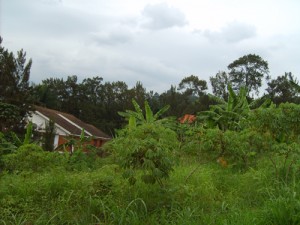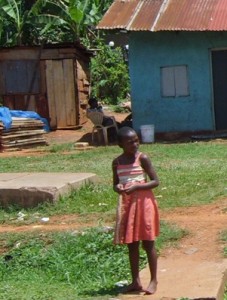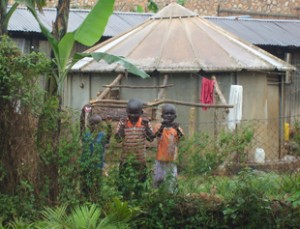Uganda AdoptionThis program is closed. Please contact Children of All Nations to learn about other programs that could be a good fit for your family. [Waiting Child Photolisting] – [Uganda News & Updates]About Uganda Adoption
Although not as rich as neighboring Kenya and Tanzania in terms of wild life, Uganda is known for its wildlife safaris, including the very rare mountain gorillas. Lake Victoria is the source of the Nile, which travels north 6,800km to Cairo. World class whitewater rafting is famous at the source of the Nile, and the climate, even though it’s on the Equator, is surprisingly mild, due to the 1500m above sea level altitude. The Ugandan culture is also known for its rich tradition of music, dance, storytelling and folklore. Governance of Ugandan AdoptionsThe Ministry of Gender, Labor and Social Development is Uganda’s central adoption authority. This Ministry oversees the Probation and Social Welfare Officers assigned to magistrate courts. Prospective parents adopting in Uganda will work with these officers in the region where the child resides. Uganda is not party to the Hague convention. If you would like more information about our Uganda program, call an adoption consultant today at (512)323-9595 or send us an email. Children AvailableChildren in Uganda are orphaned or abandoned due to illness and poverty in their families. Many children have parents or siblings who are stricken with HIV/AIDS and/or malaria. Uganda also has the second-youngest population in the world, with over half of the population being under 15 years old, contributing to a great need for child-aid. Many orphaned children attend school and this is the only home they know. Ugandan children consider regular meals, a clean shirt, medicines and even a warm blanket, luxuries. Please request our CAN guide for more details.
If you would like more information, please give us a call today at (512)323-9595 or send us an email! Uganda Adoption RequirementsIn addition to the USCIS eligibility requirements for prospective adoptive parent(s), Uganda has the following adoption eligibility requirements. If you feel you are not eligible to adopt from Uganda, or you are unsure, please contact us for a free case-by-case consultation regarding your adoption.
Uganda adoption eligibility requirements are subject to change per Uganda’s adoption laws. CAN updates these guidelines as necessary. If you would like more information about our program call us call us today at (512)323-9595 or email us. Adoption Timeline
The Process1. Application and Approval To adopt a child, please complete our online agency application. If you have any concerns about eligibility requirements, please contact us before filling out this application. We will review your eligibility to adopt from Uganda based on the guidelines of Uganda’s adoption eligibility requirements once we have received your application. If approved, we will provide you with our agency contract that outlines our fees, services and important information regarding the international adoption process. Upon receipt of your signed contract, CAN will start to provide you with placement services for a child from Uganda. 2. The Paper Chase Once your agency contract is in place, it is time to start assembling your dossier. This will include a home study, which will assess your readiness for international adoption from Uganda and help prepare you for adoptive parenthood, filing with USCIS for international adoption approval, and gathering your necessary dossier documents. These dossier documents must go through the appropriate notarization and certification. Your dossier will be reviewed and assembled at our headquarters in Austin, TX before being sent to our Ugandan lawyer for review. CAN offers a complete Elite Dossier Service to ease your international adoption process and give you peace of mind. To ensure that prospective adoptive parents are prepared for their international adoption journey, our agency requires that parents complete 10 hours of adoption training as mandated by the Hague Convention. To satisfy these hours, we have developed an online parent training program that we are proud to include in CAN’s service plan. For an overview of the program, please click here. Please contact us for more information regarding adoption from Uganda. 3. Identifying a Child As soon as a child is identified based on your preferences for gender, age and health status, you will be matched. Families may be matched before or after completing the dossier. You will receive a description of the child, including the child’s history and photos with your referral. A private investigation will be conducted on all referrals to more fully vet the child’s social history and adopt-ability. Due to the lack of resources within the country of Uganda, the private investigation must be paid for by the adoptive parents at the time of matching. After accepting a referral, families will pay monthly care fees to support the child’s care and well-being in-country. These care fees are paid up through the court appointment when the adoptive parents take custody of the child. 4. Picking up Your Child Once you have been matched with your child, our in-country Representative and Lawyer gather the necessary legal documents in order to file for a court appointment. Travel is determined after this court appointment is set and is typically around a 6 week trip. Our experienced and caring Uganda team will meet you at the Kampala airport, accompany you to all adoption-related appointments, act as your translator, and assist you with your daily activities. Families must visit the U.S. Embassy upon arrival for an adoption-information session. At the beginning of the trip, you will spend time living near the orphanage or foster home with your child so you have a chance to bond with your child, meet the caretakers, and even volunteer, if appropriate. The adoptive parents, along with any of the child’s key biological relatives, must all attend court. Both adoptive parents must attend the court hearings. After the court hearings and legal guardianship is granted, one parent may leave. Once guardianship is granted, passports are obtained for the child(ren), and the adoptive parents complete the U.S. Embassy process to finalize their adoptive child’s U.S. entry visa. The U.S. Embassy will conduct their own orphan investigation before issuing the child’s U.S. visa. 5. Post Placement Requirements Parents must file for adoption in a U.S. state court within three months of returning home to finalize the adoption. In addition, three post-placement reports are required at the first, second and third month after you arrive home. These reports demonstrate to the Ugandan government the benefits of international adoption for their children. Orphanage Information
Only children under eight years old are most often available for adoption due to the fact that older children are cared for in more permanent institutions. Orphanages, or babies’ homes, are considered temporary, as families that cannot care for their children before they are of age to attend school often leave them in the care of an orphanage. These children are not available for adoption; rather, are only temporarily being cared for by the home. This is the case for many children up to the age of about eight. After that, they are transferred to an institution for older children, where they are no longer available for adoption. In this case the children attend school and live in the home, almost like a boarding school. Resources
|




